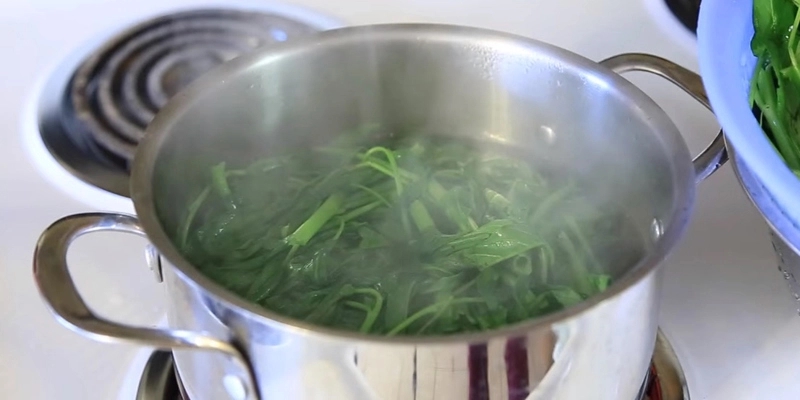When boiling vegetables, many housewives often have the habit of opening the lid. This is to help the vegetables look delicious and beautiful. However, according to Dr. Tu Ngu – General Secretary of the Vietnam Nutrition Association, when vegetables are boiled, cooked, fried, or steamed, a lot of nutrients are lost. It is necessary to know how to process and cook properly to retain vitamins and minerals in vegetables.
Normally, vitamins in vegetables will be lost over time from when the vegetables are cut, processed, and during the cooking process. When boiling vegetables, if you open the lid, the vegetables may be greener and look more beautiful, but the vitamins will also evaporate with the steam and be lost. Dr. Tu Ngu believes that to retain nutrients in vegetables, people should not open the lid of the pot when boiling or cooking soup.
In the case of not wanting the boiled vegetables to turn yellow and still retain their nutrients, people should only put the vegetables in the boiling pot when the water is already boiling vigorously. Because if you put vegetables in when the water is cold, the vitamins in the vegetables will dissolve in the water throughout the process of the water gradually heating up to boiling. When the vegetables are cooked, the amount of vitamins lost is almost gone.
To prevent the vegetables from turning yellow, the nutritional expert advises people to do the following: When the water is boiling vigorously, put the vegetables in and stir once, then cover the lid. Wait for the water to boil again, stir the vegetables once more, then cover the lid, wait for the water to boil and remove it immediately. With this way of boiling, the nutritional value in the vegetables will not be lost much and the vegetables will still have a beautiful green color.
In addition, people also need to note not to boil vegetables for too long because the longer they are exposed to heat, the more vitamins are lost.

Boiling vegetables (illustrative image).
Properly processing vegetables to avoid losing nutrients
Dr. Tu Ngu said that, in addition to boiling vegetables properly, the step of processing vegetables is also extremely important, determining the nutritional value of the vegetables. Accordingly, when buying vegetables, people need to pick out yellow leaves and wash them thoroughly. Note that when washing vegetables, do not crush them because the vitamins will leak out and dissolve in water.
With some types of vegetables that are easily crushed such as jute, spinach, water spinach, and luffa… do not cut them into small pieces before washing, and when washing vegetables, it is also necessary to be gentle, avoid squeezing them hard to limit the loss of nutrients.
How to choose safe vegetables
According to the General Secretary of the Vietnam Nutrition Association, it is very difficult to distinguish between clean and “dirty” vegetables with chemicals with the naked eye. Therefore, in order to choose safe vegetables, he has set out 4 principles:
– Prioritize choosing vegetables in season to limit the use of pesticides
– Prioritize choosing types of vegetables that are less susceptible to pests and diseases to limit the use of pesticides, such as water spinach and water spinach…
– Prioritize eating vegetables and fruits.
– Eat a variety of vegetables in the same meal.
According to the World Health Organization (WHO), the minimum recommended intake of fruits and vegetables is 400g/person/day. This amount of fruits and vegetables does not include potatoes and other starchy tubers to prevent chronic diseases such as heart disease, cancer, diabetes, and obesity, as well as prevent and reduce deficiencies in some micronutrients.
WHO also emphasizes that 400g of fruits and vegetables/day is the minimum recommended level. Countries and territories can, depending on the natural characteristics and eating habits of the people, establish their own recommended levels, but they should not be lower than 400g/person/day.
According to Doi Song Phap Luat
Unveiling the Miraculous Benefits of Mushrooms
From the savory flavor they offer in dishes to their vast array of health benefits, mushrooms are a major force in the culinary world. Not only are they known as a delicious ingredient in countless recipes, but their impressive benefits can help to fight obesity, high blood pressure, and even cancer prevention.





































